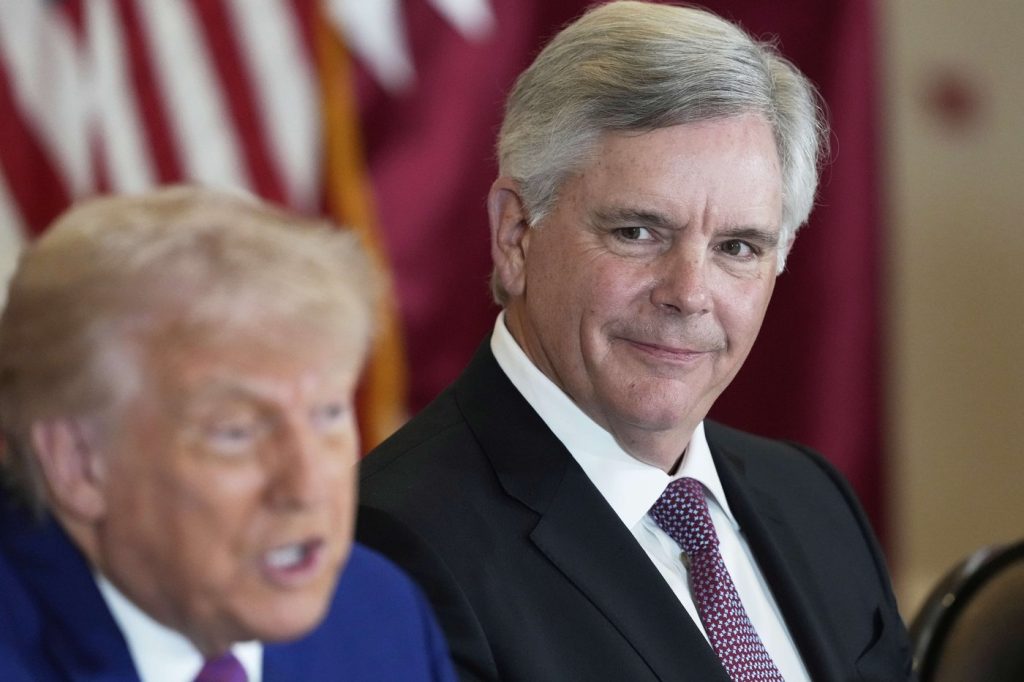In recent days, President Donald Trump concluded a Middle East tour, but he wasn't the only one making critical visits to the region. A private jet carrying Nvidia’s CEO trailed Air Force One, accompanied by various oil executives and bankers. These corporate leaders abruptly canceled longstanding commitments and returned to board meetings to strengthen ties with Trump, attempting to enhance the favorable image he projected during his inaugural major foreign trip.
With Trump back in the White House, engagements with the president have become a standard affair for American business titans, equivalent to attending industry conferences. More than ever, corporate leaders are investing time and resources to gain favor with the administration amid a backdrop of regulatory relief and tariffs. Trump, for his part, appreciates utilizing these executives as a supporting cast, showcasing a thriving economy even as economic growth slows.
However, this outreach has not fully shielded major companies like Apple, Amazon, and Walmart from Trump’s discontent. The alliances forged by these companies often serve more to bolster Trump’s image than to solidify their business interests, highlighting the unpredictable dynamics at play.
During the Middle East trip, executives expressed astonishment at how they found themselves as unofficial members of Trump's entourage, flying alongside the president as he visited Saudi Arabia, Qatar, and the United Arab Emirates. They recognized they had little choice but to align closely with Trump due to the influence he holds over tariff policies.
Trump himself remarked in Abu Dhabi on the importance of his role as a "cheerleader for our country," whilst contrasting his efforts against his predecessor, Joe Biden. The host countries, in collaboration with the White House, organized business conferences within a matter of weeks, creating a stage for Trump to display his deal-making prowess. During these events, business leaders formalized partnership agreements and spoke of mutual investments, almost performatively in front of Trump and regional elites.
The president has shown a propensity to direct business opportunities towards those who flatter him, as evidenced by his promotion of Tesla's Elon Musk, while conversely punishing entities that fall out of his favor, such as Amazon during Trump’s first term. Jeffrey Sonnenfeld, CEO of Yale's Chief Executive Leadership Institute, characterized the interactions as obsequious behavior by CEOs, which could lead to improved treatment from the government.
Foreign executives are also making their presence felt. Recently, French luxury giant LVMH’s Bernard Arnault met with Trump in the Oval Office, where Trump expressed gratitude for the “Medals of Sacrifice” made by Tiffany & Co. for families of fallen law enforcement officials. Despite declining stock values due to tariffs impacting their diverse product lines, Trump’s praise for LVMH highlighted the complexities of these engagements.
Influencing Trump has proven to be a complex task. While many CEOs have felt the need to maintain regular contact with Trump’s team, such interactions do not guarantee that their perspectives on tariffs and regulations are effectively communicated to him. Some executives have pointed out that they often lack clarity regarding which individuals within Trump’s circle can relay their views most effectively. Treasury Secretary Scott Bessent has emerged as a preferred interlocutor, but even that doesn't fully shield companies from Trump’s criticism.
For example, Walmart CEO Doug McMillon was publicly admonished by Trump via social media for not absorbing tariff costs, despite having a prior scheduled call with Bessent. In another instance, Trump called out Amazon founder Jeff Bezos over potential pricing changes related to tariffs, indicating ongoing tensions even amidst meetings.
Lastly, the heads of prominent American automotive companies met with Trump to discuss the adverse effects of tariffs on the auto industry. Although they received temporary reprieves on certain domestic vehicles, Trump maintained a hefty 25% tax on imported steel and aluminum, framing his tariff changes as transitional measures to encourage domestic production.
Despite efforts, CEOs like Apple's Tim Cook also face scrutiny; Trump openly expressed displeasure at Apple's plans to expand production in India, emphasizing his desire for domestic investment. Conversely, Jamie Dimon of JP Morgan Chase effectively influenced tariff adjustments after publicly advocating for trade negotiations. His comments resonated with Trump, highlighting the unique ways business leaders can navigate and impact policy discussions.











